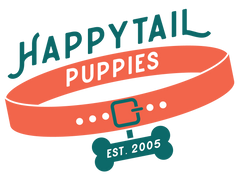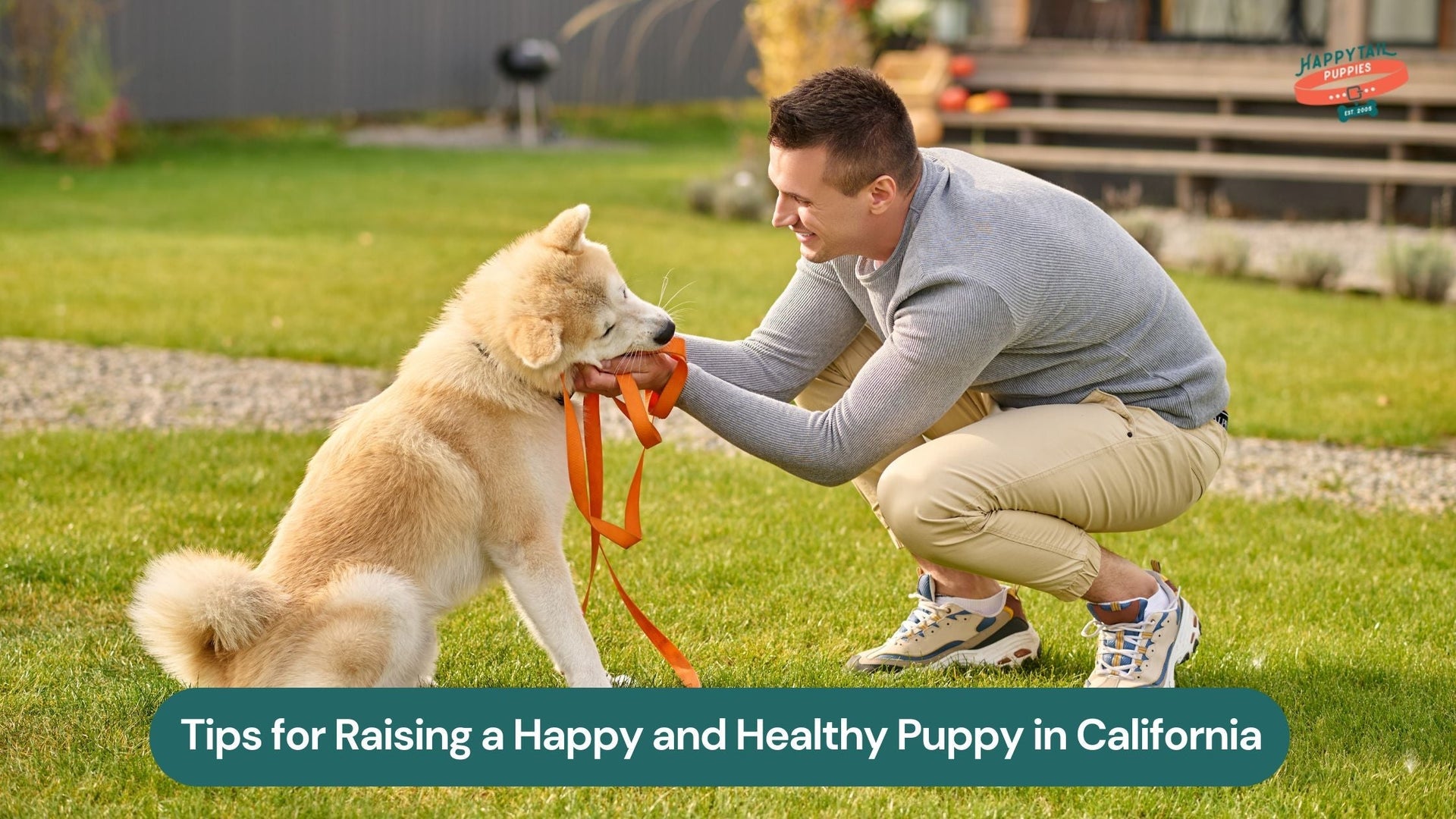Tips for Raising a Happy and Healthy Puppy in California
Raising a happy puppy in California's unique climate requires preparation. This guide covers everything from pet-safe housing and vet prep to daily routines, socialization, and managing climate risks.
The Golden State of California has the most dog-friendly places in the US. In its warm weather, vast areas of green space, and in its culture that focuses on living outdoors, it is the optimal place to keep a pup. Bringing up a pup here creates infinite possibilities to bond, have adventures, and train, but it requires planning, organization, and a sense of the local intricacies.
Pup parents should stay prepared for effective heat management, urban distractions, besides the financial and legal responsibilities involved with puppy care. In our post today, we will help to empower you in raising a happy puppy in California to ensure that you stay equipped to learn how to raise a puppy with expert guidance.
What You Need Before Bringing a Puppy Home
You should take care to be emotionally, practically, and financially ready. These necessities assist in establishing a formidable basis and even address the issue of how to raise a happy puppy.
- Pet-Safe Housing: To protect your things and your pet, make your house safe from the puppies. Watch out for toxic plants, wires, or sharp edges. Small breeds such as a Teacup Pomeranian tend to fare well in apartments but require both a play space and a resting space.
- Vet and Health Prep: Find a vet nearby who accepts new patients and offers well-structured health plans. Ask if they offer puppy care packages including microchipping, vaccines, and parasite prevention. Also, keep emergency services on a recent dial for any situations that require them.
- California Legal Requirements: Ensure to scroll through the specific pet laws in your county. Several cities need licensing, leashing in public spaces, and rabies vaccinations. If you plan to take your pup on a walk, the right ID tag is also mandatory.
- Budgeting and Costs: The initial year expenses will be more than 2,000 because of the vet's possible visits, materials, training, and grooming. In case of need, consider the financing options available with credible breeders, which cover vet care, wellness membership plans, etc.
- Breed Lifestyle Matching: Choose the breed that is representative of your living conditions and energy. Energetic breeds require more stimulation and space. Talk to your breeder regarding the breed's special needs, behavioral, and grooming patterns.
Tips to Know How to Raise a Perfect Puppy
It should not be up to chance that one creates a perfect pup. Successful intervention, structure, and proper routine are important elements in shaping the pup's behavior and long-term health. In the sections below, we will divide the crucial areas of care to assist you in learning how to raise a healthy puppy.
Build a Structured Daily Routine
Puppies live on a routine. Potty breaks, feeding, training, and sleep must follow an orderly routine. Resting at noon, getting up in the morning, a regular feeding schedule, and playing in the evening work to train your dog about what will happen and when. A predictable lifestyle aids in minimizing anxiety, promotes house training, and provides an ideal foundation for improving impulse control.
Consistency even helps prevent puppy behavioral issues. Pups who know their routine are less likely to develop destructive habits or anxiety. A study published in Scientific Reports has highlighted that dogs with regular interactions have notably reduced stress-induced behavior.
Prioritize Early Socialization
Socialization is no more about exposure alone than it is about positive exposure. Adding your puppy to well-controlled environments like parks, outdoor cafes, or family homes is a great approach. Ensure that you use a leash and treats, ensuring that each of the new experiences provides a better sense of reassurance.
Early socialization further helps to redefine confidence, preventing fear-induced behaviors later. The American Veterinary Society of Animal Behavior highlights that the vital social window closes around 16 weeks, which delays exposure to the risk of behavioral issues. Ensure to introduce your pups to people in sunglasses, smooth surfaces, and loud noises for a real-world experience across the bustling cities of California.
Provide Mental Stimulation and Enrichment
The mind is active and is as important as the body at play. You can also get your puppy to scent puzzles, interactive games, issues that involve solving, and obedience games. These will narrow the focus of your pup and eliminate mischief caused by boredom.
You can begin to introduce them to games of agility or hide-and-seek that you can practice individually in the house when your pup is growing. Bright puppies will be less prone to behavioral problems because they are active. Providing them with various puzzles, textures, and scents can relieve such problems as "Why do Puppies Chew on Everything?" One such reaction is chewing, which comes as a result of boredom or the desire to self-soothe.
Feed a Balanced, Age-Appropriate Diet
Proper and timely feeding can help your puppy grow mentally and physically. Use formulas with specific labels, such as puppy growth or development. Small dog breeds usually love high-calorie food, but they need the right calcium proportions to prevent joint problems.
Never forget, as a pet parent, that overfeeding silently flaunts a red flag. Portion control is one of the dangers of obesity in dogs, such as hip dysplasia, diabetes, and shorter lifespans. Remember to follow the feeding directions indicated on the labels, get advice on calorie requirements based on your pet pup's energy levels, and seek the opinions of a vet.
Adapt to Seasonal Grooming and Skincare
The warm climate of California proves harsh on the coats of a few pups. Brush their coat frequently, removing loose hair and stimulating health oils. Avoid overbathing your dog, which strips the protective shield of their skin.
The winter months bring some new challenges. Dogs need to wear booties or moisturizers, adjust bathing frequencies, and safeguard their sensitive paws. Knowing about dog winter care tips ensures that you never get caught off guard. The cooler temperatures may appear mild, but they have a huge impact on small or short-coated breeds.
Handle Climate Risks for Puppies
California's summers are punishing. Heatstroke, hot asphalt, and dehydration pose significant risks. Try taking your puppies out for a walk during the early evenings or mornings, when the temperature is comparatively cooler. Also, carry a portable water bowl, and do not forget to leave your car.
Equipping yourself with summer dog care tips can help save their lives. Use pet-safe sunscreen for light-colored breeds and make shade breaks a habit. Hot weather training should be performed in short bursts to avoid overheating.
Train for Long-Term Behavioral Success
Try using consistent and short sessions paired with top-value rewards. Puppies with short attention spans should have restricted outdoor activities with reduced exposure time to 10 minutes. Try focusing on the basic commands like come, sit, stay, and leave it.
Crate training also comes in handy as it promotes security, prevents destructive chewing, and eases separation anxiety. Ensure that the crate is introduced as a safe space and not as a punishment.
Professional obedience classes offer a well-structured path. For those in search of rapid progress or a reliable temperament, buying professionally trained puppy options is increasingly gaining popularity in California. Several certified trainers are offering pre-trained pups that adjust to their forever homes with fewer challenges.
Maintain Regular Grooming Based on Breed
Every breed has its grooming schedule. For instance, the Toy Poodle needs frequent trims and detangling to prevent matting, while short-haired dogs often need weekly brushing.
Ear cleaning, nail trimming, and dental care are often overlooked; however, they are important. Initiate these routines with your young pup so your pup can tolerate them as an adult. Ensure to use breed-focused shampoos and grooming tools.
Prevent Anxiety and Destructive Habits
Separation anxiety is typically common among puppies who are left alone without any preparation. Try practicing moments of leaving your pup for short whiles and slowly extending your time off. Use soothing music or puzzle feeders to create a calming ambience.
Calm greetings and departures are important. Try avoiding hyping your pup when arriving or going. Build this emotional independence to prevent any barking, accidents, or destructive chewing.
Ensure Proper Exercise
Every breed has its specific level of exercise; however, all pups benefit considerably from movement and structured play. Herding breeds often need more mental challenges than physical ones, although working breeds love extended walks.
Any under-exercised pup becomes frustrated or hyperactive. Tug games, walks, interactive fetch, or obstacles offer bonding and the right level of stimulation.
Enroll in a Puppy Training Class
Professional classes will keep you and your dog disciplined. Trained professionals assist in correcting behaviors at an early age and in the fundamentals of effective communication. Group classes also improve socialization and impulse control.
Seek out those classes that employ positive rewards as opposed to punishment. Good trainers also offer tips tailored to breed-specific behavior. An early enrolment will keep the spurt out so that you are not in a hurry when bad habits start at the formative stage.
Create a Comfortable Sleeping Environment
Puppies deserve as much as 18 hours of sleep per day. A comfortable, silent bed will contribute to good health and help avoid overstimulating. Use a crate or enclosed pen to make it feel safe and schedule-driven.
Keep the bedroom out of walking or talking traffic areas. Puppies who rest well grow better and behave better. Providing toys, soft bedding, and scent-soothing objects, such as a worn T-shirt, may also enhance the quality of rest.
Schedule Routine Health Checkups
Regular vet visits prevent long-term problems. Hip problems, dental problems, or imbalances in the digestive system can be checked early, which can save thousands in the future. Schedule vaccines, spay/neuter dates, and deworming early.
It is also a normal procedure because these regular visits make your pup accustomed to professional handling. To promote lifelong health, a well-adjusted dog is simpler to check up on, treat, and groom as it grows.
Conclusion
Bringing up a healthy and happy puppy in California requires a careful, planned approach, understanding the environment, and commitment. Every exercise you create, vet visit you make, and training session you teach is crucial in determining your puppy in the future. A bit of regular nurture and warm discipline, an understanding of what works and what does not work, will make you not a dog owner, but a lifetime friend, wherever the winds blow across the Golden State.


